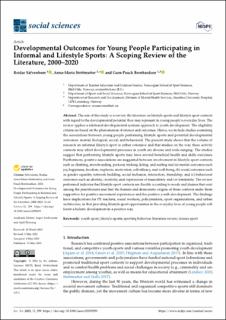| dc.description.abstract | The aim of this study is to review the literature on lifestyle sports and lifestyle sport contexts with regard to the developmental potential they may represent in young people’s everyday lives. The review applies a relational developmental systems approach to youth development. The eligibility criteria are based on the phenomenon of interest and outcomes. Hence, we include studies examining the associations between young people performing lifestyle sports and potential developmental outcomes: mental, biological, social, and behavioral. The present study shows that the volume of research on informal lifestyle sport is rather extensive and that studies on the way these activity contexts may affect developmental processes in youth are diverse and wide ranging. The studies suggest that performing lifestyle sports may have several beneficial health and skills outcomes. Furthermore, positive associations are suggested between involvement in lifestyle sport contexts such as climbing, snowboarding, parkour, tricking, kiting, and surfing and (a) mental outcomes such joy, happiness, freedom, euphoria, motivation, self-efficacy, and well-being; (b) social outcomes such as gender equality, network building, social inclusion, interaction, friendship; and (c) behavioral outcomes such as identity, creativity, and expressions of masculinity and/or femininity. The review performed indicates that lifestyle sport contexts are flexible according to needs and desires that exist among the practitioners and that the human and democratic origins of these contexts make them supportive for positive movement experiences and for positive youth development. The findings have implications for PE teachers, social workers, policymakers, sport organizations, and urban architecture, in that providing lifestyle sport opportunities in the everyday lives of young people will foster a holistic development in a positive way. | en_US |
